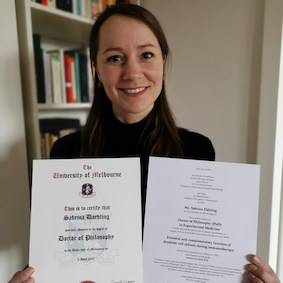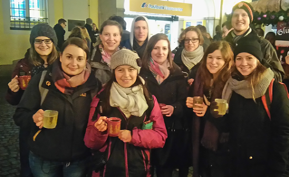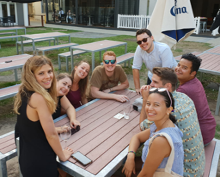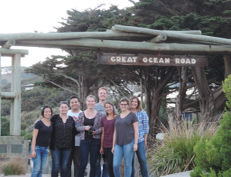After finishing my masters degree in Infection Biology and looking for new opportunities, a friend of mine told me about the new Bonn & Melbourne Research and Graduate School. I remember while reading the PhD advertisement, I became very excited. This pictured a perfect opportunity to conduct immunological research on two different continents and if everything should go right even meant holding a PhD at the end of it. Among the different projects I found one particularly interesting and decided to give it a try and send my application. I was invited to give a talk and spend a day at the Institute of Experimental Immunology in Bonn. Believe me: I was super nervous. But at the end of the day also super happy as I was accepted into the program with Bonn being my main location.
For the thesis I studied the role of dendritic cells for successful checkpoint immunotherapy during chronic viral infection. The first year of my PhD was all about learning new techniques, understanding the scientific background, setting up new models and methods and basically just becoming familiar with being a PhD student. To be honest, it was probably not much different from a regular PhD outside a joint program or graduate school. However, there is one particular thing that really helped me a lot, which is being part of a graduate school with other PhD students having started at the same time with you. As part of the Bonn & Melbourne Research and Graduate School we had monthly data seminars where two students presented their project updates. As we were basically all on the same level, we practiced our presentation skills and discussed our projects in an inspiring and still relaxed atmosphere. Of course, this meant extra work, but it clearly gave us extra benefits as well.
As the second year started the project was running quite well. Time went by very quickly and I already had to prepare for the third year of my PhD, which I spend in Melbourne. This was still the first round of the program and as with everything new, it needed time to develop and improve. For a joint PhD communication and planning is everything. To be honest, I could have planned a bit better, but luckily with a network of different research groups being part of the program, I was able to keep working on my PhD thesis project in Melbourne. In total, I spent nearly 14 months there and really appreciated the chance to discover the scientific research community at the other end of the world. And again, being together with other PhD students I already knew from Bonn and additionally being part of the Melbourne PhD student group immediately made the transfer to Melbourne much easier. I truly enjoyed the time: working hard as it was time to finish the thesis but also making sure to explore the country and travel with friends.
Finally, I moved back to Germany, happy to be close to family and friends again and able to finish my PhD with a lot of support from both of my supervisors and colleagues from both groups. As it started with me giving a talk when applying for the PhD position, it also ended with me giving a talk and of course being quite nervous again – as this time it was my defence talk with family, friends and colleagues ready to have a sip of sparkling. Ultimately, I can honestly recommend the program. It is definitely challenging to do a PhD and to pursue it with two different groups located in two countries with a minimum time gap of 8 hours doesn’t necessarily make it easier. But for me it was definitely the right decision as I developed not only on an academic level, but also on the personal. I’m thankful for all the experiences – thanks to the Bonn & Melbourne Research and Graduate School. Cheers!




Sabrina Dähling
“Essential and complementary function of dendritic cell subsets during immunotherapy”